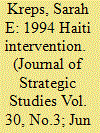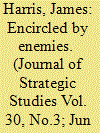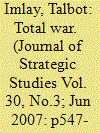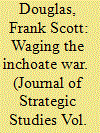| Srl | Item |
| 1 |
ID:
079237


|
|
|
|
|
| Publication |
2007.
|
| Summary/Abstract |
Observers of United States (US) interventions have almost universally characterized the 1994 Haiti intervention as multilateral, a model for how international cooperation can achieve common security goals. A closer analysis of the intervention reveals that the planning and execution of the intervention were almost entirely unilateral and therefore cost the US few if any of the theoretical costs of coalition warfare, including interoperability and policy compromise. Mapped onto the unilateral strategy and operation of the intervention, however, was a multilateral diplomatic effort that secured United Nations Security Council authorization and provided a cover for an intervention that the US had already planned and intended to execute with or without that authorization. That the US sought a multilateral cover for an intervention that it could easily accomplish unilaterally shows the importance of two factors: A domestic audience that opposed unilateral peacekeeping but would accept using US resources as part of a broader multilateral operation, and a local population that would be more responsive to a multilateral coalition than a use of force that was perceived to be unilateral. The Haiti intervention shows that the determinants of success in operations other than war are as much political as military. When the US already has overwhelming military superiority vis-à-vis its adversary, building military coalitions becomes as much about enlisting political support as aggregating material capability.
|
|
|
|
|
|
|
|
|
|
|
|
|
|
|
|
| 2 |
ID:
079239


|
|
|
|
|
| Publication |
2007.
|
| Summary/Abstract |
The article examines Stalin's intelligence on the capitalist world, including materials from military archives, diplomatic archives, and Stalin's private papers. It explores how these materials were collected, interpreted and shaped by Stalin's prejudices. It concludes that, from the end of the Civil War to the Nazi invasion, Stalin and the Soviet leadership believed that the Soviet Union was under a nearly constant threat of invasion from shifting coalitions of capitalist powers. No such threat existed until the late 1930s, but Stalin's perceptions have important implications for our understanding of Soviet foreign and domestic politics in the interwar period
|
|
|
|
|
|
|
|
|
|
|
|
|
|
|
|
| 3 |
ID:
079236


|
|
|
|
|
| Publication |
2007.
|
| Summary/Abstract |
The changes in the nature of warfare and its transformation toward Low Intensity Conflict (LIC) intrastate conflict have challenged the patterns of interaction between the political and the military echelons in Israel. It seems that the political echelon's superiority is maintained at the institutional and formal levels, but on the substantive level, which demands relying on knowledge and systematic staff work, the political echelon's position is weakened and loses its validity.
Introducing the military echelon in Israel as an epistemic authority regarding the violent confrontation and the main outlines of the military knowledge development process might clarify why the absence of the required dialogue between the echelons and the weakness of the intellectual effort increased the military's influence over the shaping of Israeli conflict-management strategy. The argument's validity and its explanatory power can be found relevant for other countries whose militaries are deeply involved in the management of LIC.
|
|
|
|
|
|
|
|
|
|
|
|
|
|
|
|
| 4 |
ID:
079238


|
|
|
|
|
| Publication |
2007.
|
| Summary/Abstract |
This essay explores the evolution of American nuclear targeting during World War II. Initial discussions in Washington focused on the use of the bomb against a military target. The assumption that cities would be the primary target for the atomic bomb apparently originated at Los Alamos in 1943 - 44, largely as a result of technical concerns related to the delivery and functioning of the weapon. Some high-level officials in Washington voiced reservations about the use of nuclear weapons against primarily civilian targets. Ultimately, the accumulated momentum of previous technical decisions and a desire to use the bomb as quickly as possible for military-diplomatic reasons convinced the President and his advisors to overcome reservations about targeting Japanese cities and civilians
|
|
|
|
|
|
|
|
|
|
|
|
|
|
|
|
| 5 |
ID:
079240


|
|
|
|
|
| Publication |
2007.
|
| Summary/Abstract |
This article reviews the five volume series, published by Cambridge University Press, on the history of total war from the American Civil War and Wars of German Unification to World War II. The discussion focuses on two questions: how to define total war; and is total war a useful conceptual tool for understanding warfare during this period? Although the editors were unable to come up with a definition of total war, they did identify elements or tendencies that together contributed to the growing totalization of war during the nineteenth and especially twentieth centuries. Regarding the second question, the editors suggest that total war is best thought of as an ideal type, one to which reality can approach but never reach. If this use of total war facilitates comparison between wars (and different aspects of one war) by providing a common standard, it leaves open the question of how to undertake such a comparison.
|
|
|
|
|
|
|
|
|
|
|
|
|
|
|
|
| 6 |
ID:
079235


|
|
|
|
|
| Publication |
2007.
|
| Summary/Abstract |
This article answers three questions: What is the nature of the Long War? How is progress (or lack thereof) to be assessed? Where is it likely to go next? An appreciation of Clausewitz shows that practical centers of gravity exist for the Long War, and that the conflict pivots upon the ability to persuasively link ideology to events via a strategic narrative. A close examination of an illustrative case study, the interaction between the US and the late Abu Musab al-Zarqawi in Iraq 2004 - 2006, shows that Al Qaeda has suffered a severe setback, but also that the nature of the war is set to shift yet again. Further tangible progress for the US requires waging the Long War as a global counterinsurgency based on a strategy of 'selective identification' (versus pure 'disaggregation') as well as an understanding of how to more effectively craft a strategic narrative.
|
|
|
|
|
|
|
|
|
|
|
|
|
|
|
|